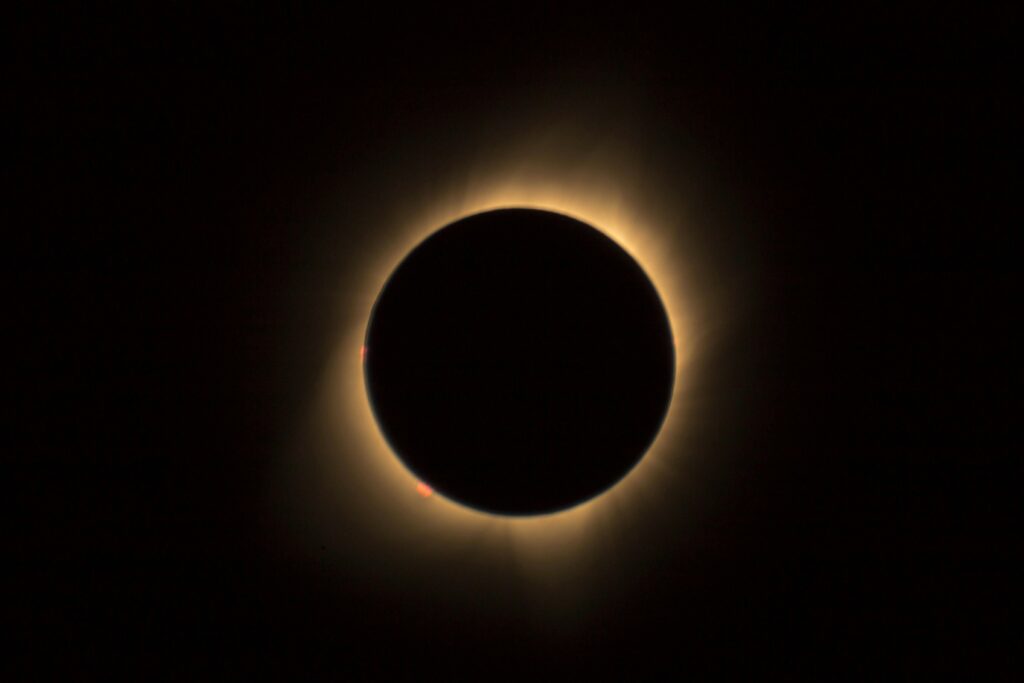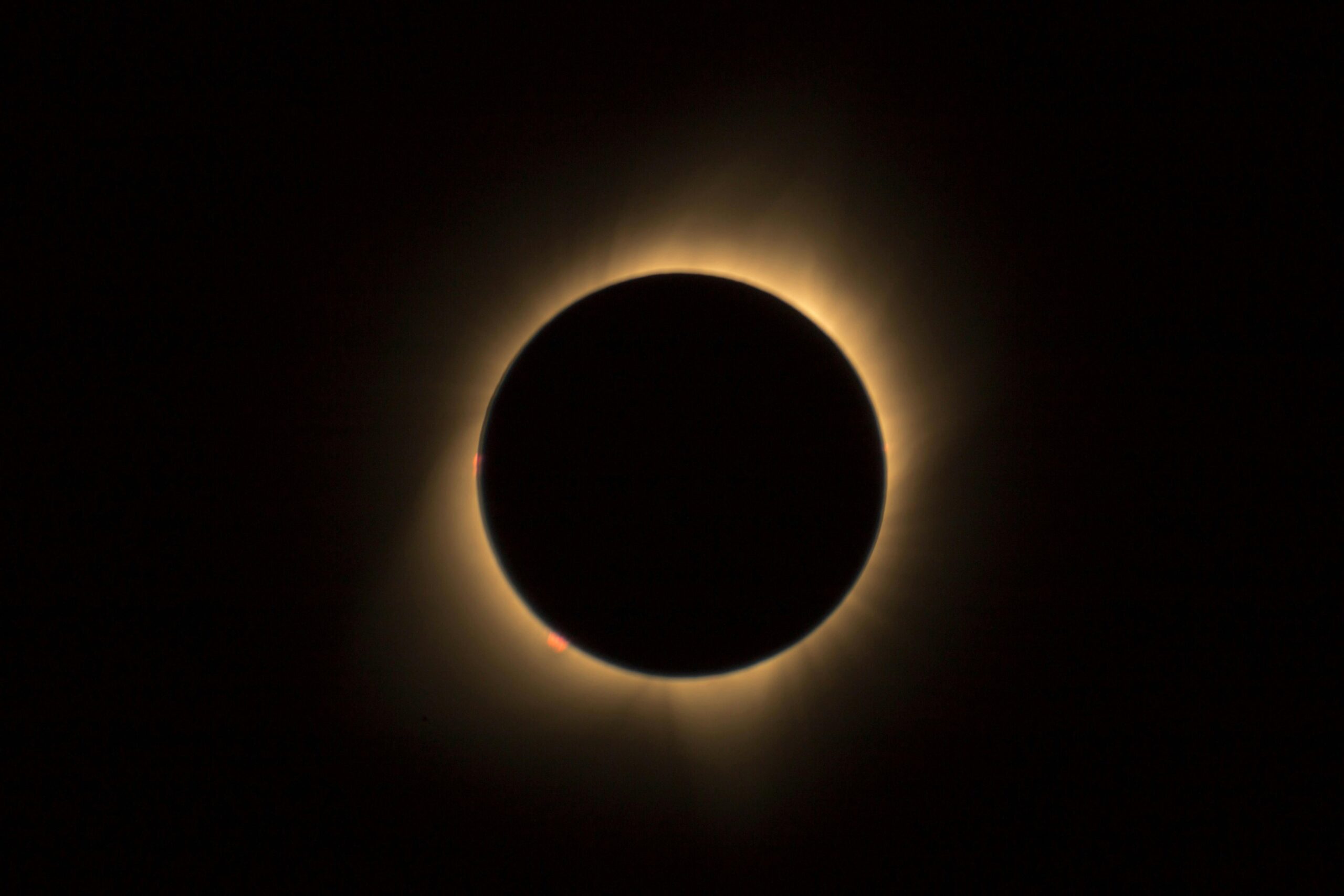My father devoted his entire professional life to teaching middle school science. Even when he wasn’t in the classroom, he couldn’t separate himself from imparting scientific knowledge. In 2017, the last time the U.S. experienced a total solar eclipse, we all piled into the car and drove 9 hours to experience the totality. It was exciting, but as the mother of three boys, then ages 3, 5, and 7, I was more focused on making sure no one’s retinas were damaged! My dad took great joy in regaling us with astronomical facts, figures, and trivia because he could not help but teach; it coursed in his veins.

Seven Years Later…
Now, some seven years later, with my boys more reliably able to keep eclipse glasses on, I’m able to focus on the science of the moon passing between the Earth and the sun. To my dismay, I don’t recall many of the facts, figures, and trivia my dad so lovingly tried to impart. I wasn’t consciously aware of my forgetting until my boys, curious about the world around them, started asking me questions. It became very obvious, very quickly, that I have forgotten much of the good science-y stuff my dad taught me.
Eclipse? What’s That?
In my learning theories class in graduate school, we learned about cognitive information processing, or CIP, and it struck a chord with me. It felt very close to neuroscience to me and I found that fascinating. Cognitive information processing has a lot to say about the nature of forgetting. According to Dale Schunk, “forgetting involves the loss of knowledge from memory or the inability to retrieve knowledge” (Schunk, 2020, p. 227). Schunk goes on to say that researchers disagree about whether we actually lose information or we just cannot retrieve it because of incorrect cues, interference, etc. (Schunk, 2020).
I learned about eclipses at some point; in fact, I am pretty sure it was in middle school. I recall making an entire “magazine” about the moon. To make the magazine structure, I used a purple paper folder. Also, I clearly remember drawing the phases of the moon as one of the articles. But I don’t remember enough information to answer the questions my boys asked me about the eclipse: Will they be able to see the sun’s corona in our area of 99.4% totality? How dark will it get? Will the streetlights turn on? Is it going to be like the phases of the moon, but really fast? Thankfully, Google rescued me and gave me the help I needed.
So What Happened in My Brain?
Where did my astronomical acumen go? CIP researchers and theorists offer several explanations as to how and why I forgot what I used to know. One of those explanations is decay. Decay, in layman’s terms, is basically: “use it or lose it.” In theoretical terms, Schunk says that our brain cannot store (remember) everything we have ever learned, so our brain discards information that has not been used or we no longer need (Schunk, 2020). From a neuroscience perspective, Schunk also says, “we are born with a large number of neural (synaptic connections. Our experiences then work on this system. Connections are selected or ignored, strengthened or lost, and can be added and altered through new experiences” (National Research Council, as referenced in Schunk, 2020, p. 49).
Decay could explain my forgetting because there have really only been two times in my life that I have retrieved that information – once during the initial encoding (learning) phase and then once again when my dad was handing out science knowledge like candy. In both cases, so much time elapsed that the synaptic connections between that information and other knowledge weakened and eventually, the eclipse and other science knowledge was discarded in deference to other, more frequently retrieved information in my brain.
What About the 2024 Eclipse?
My dad passed away in late 2020, but I inherited a large number of books from his personal library. In this collection was an impressive number of books on space and astronomy (and dinosaurs, but that’s not relevant here). Today, before I picked up my boys early from school so we could enjoy the eclipse together, I pulled out one of the books. The book, Universe, from DK Publishing, is beautifully illustrated, and full of interesting facts. One struck me: “the shadow cast by the Moon during a total solar eclipse consists of the central umbra (associated with the area of totality) and the penumbra (area of partial eclipse)” (Rees, et al., 2008, p. 63). Seeing the words “penumbra” and “umbra” took me right back to middle school and that purple-folder-moon-magazine. Maybe the forgetting problem isn’t decay. Maybe my forgetting problem is because I wasn’t be presented with the correct cue to retrieve the information. But that is another question for another day.
If You Have a Science Enthusiast in Your Life…
I highly recommend the DK Publishing books. They have large reference books that are fully illustrated with wonderful pictures. The information is easy to digest, but relevant. And no, this is not a promoted ad for them. I just own a bunch of their books in our home library and my family really enjoys them.
And for what it’s worth, use your knowledge so you don’t lose it.
Rae, D. (2017, September 8). Eclipse digital wallpaper. [Photograph]. Pexels. https://www.pexels.com/photo/eclipse-digital-wallpaper-580679/
Rees, M., Frances, P., Garner, G., Houston, R., Pitts, G., Summers, D., Chishom, Hoare, B., Simmonds, J., Sparrow, G., Twyman, N., & Heilman, C. (Eds.). (2008). Universe. DK Publishing.
Schunk, D. H. (2020). Learning theories: An educational perspective (8th ed). Pearson.

